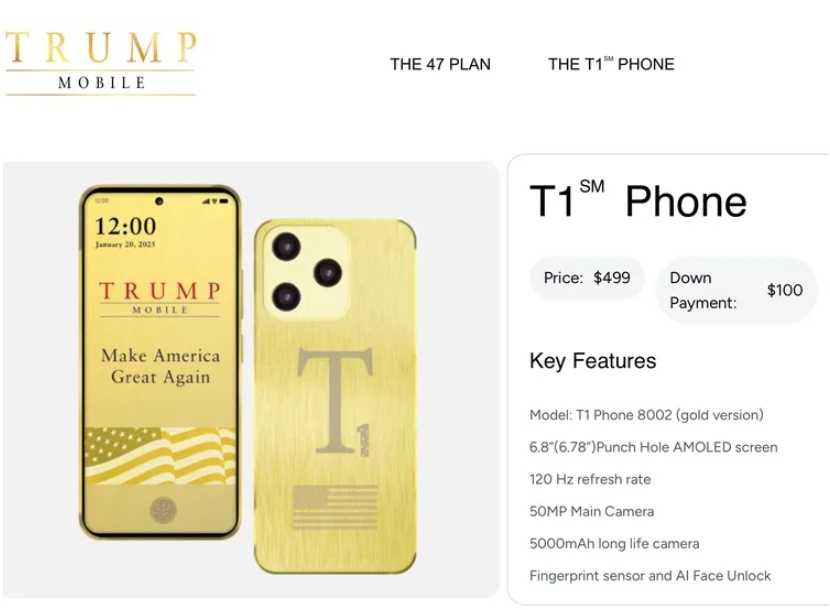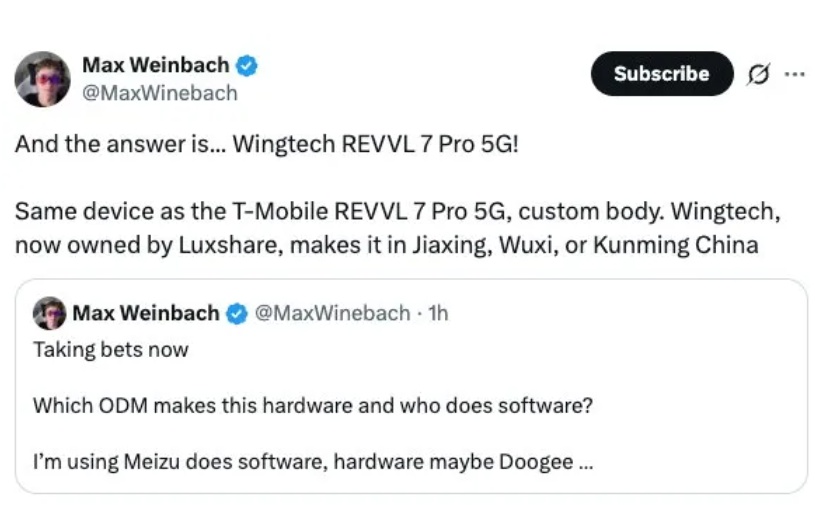Trump's Phone "Made in America" Controversy: Is It Being Manufactured by China's Luxshare? Can American Manufacturing Take Root?
On June 16th local time, the Trump Organization announced the launch of its own brand of mobile phone, Trump Mobile, and its first model, the T1, priced at $499 (approximately 3580 RMB). The phone claims to be "designed and manufactured in America," with a golden body embedded with the American flag. It features a 6.8-inch AMOLED screen, 12GB of memory, a 5000mAh battery, and Android 15 system. It primarily emphasizes "patriotism" and "domestic manufacturing."

T1 Image source: Trump Mobile
However, analysts at Apple Insider note that the device bears a strong resemblance to the T-Mobile REVVL 7 Pro 5G, which is developed and manufactured by Wingtech (the ODM business is affiliated with Luxshare Precision) in China. Therefore, the claim of it being "Made in America" may be disputed.

Image source: X
T1 and T-Mobile REVVL 7 Pro 5G are highly similar: the screen parameters, the peculiar combination of a 50-megapixel main camera and dual 2-megapixel secondary cameras are completely identical, while the latter...By (WandTechnology) from China,WingtechOEM (Original Equipment Manufacturing);
Production location doubts: Supply chain information shows that the components of the REVVL 7 Pro are produced in factories in Jiaxing, Wuxi, or Kunming, China. Eric Trump, the son of former President Trump, also admitted that "the first batch of phones is not made in the United States."
The official website shows that Trump Mobile is now accepting pre-orders for a new phone, with a deposit of $100, expected to be released in August and manufactured in the United States. Industry insiders point out that it is almost impossible for Trump Mobile to establish a domestic smartphone manufacturing system from scratch and deliver a phone priced at $499 in August.
So, what are the stories behind this phone? Monocular Vision provides an overview for you.
I. Supply Chain Reality: Globalization is Irreversible, "Made in America" is Difficult to Achieve
Based on the above analysis, Trump's claim of "made in America" has faced multiple challenges.
First of all, there is a shortcoming in the supply chain. The United States lacks a complete mobile phone industry chain. Core chips rely on TSMC for foundry, screens/memory are supplied by South Korea and Japan, and assembly lines are concentrated in China. Even Apple needs a large number of Chinese components.
Next is the cost dilemma. Achieving complete localization of smartphones in the United States would require billions of dollars in investment. Analysts point out that the high labor costs in the U.S. make it impossible to establish a system matching China's production capacity in the short term.
Perhaps Trump's phone simply wants to adopt a "modular localization" approach: T1 may take the "Chinese components + American back cover printing + local assembly" model to meet the legal minimum standards for the "Made in America" label.
II. Behind-the-Scenes OEM: Luxshare Precision's Capital Strategy in Acquiring Wingtech
The hardware source of Trump's mobile phone directly points to China's ODM (Original Design Manufacturing) giant Wingtech Technology and its acquirer Luxshare Precision Industry (short for Luxshare):
Wingtech is a leading global mobile phone ODM company, having produced for brands such as Samsung, Xiaomi, and OPPO, accounting for approximately 30% of the global ODM market share; due to continuous losses in its ODM business (net loss of 447 million yuan in 2023, and a loss of 850 million yuan in the first half of 2024), it has been forced to divest.
The acquirer is Luxshare. In January 2025, Luxshare acquired equity in three companies, including Jiaxing Yongrui Electronics under Wenta, for 616 million yuan; in March 2025, Luxshare further acquired six subsidiaries, including Kunming Wenxun under Wenta, for 5.19 billion yuan, totaling an expenditure of 5.8 billion yuan to integrate its mobile phone ODM assets.
Acquisition of Wingtech ODMAfter the business, Luxshare Precision accelerated its layout:
Technical integration: absorb Wentai's design capabilities in mid-to-low-end Android models, targeting Southeast Asia and Latin American markets.
Diversify risks: Reduce reliance on Apple and enter Samsung and Xiaomi supply chains;
Automation Upgrade: Increase R&D in AIoT and Automotive Electronics, Robot Algorithm Engineer Positions to Surge by 479% by 2025.
Luxshare's goal is also very clear: to enhance the Android ecosystem's manufacturing capabilities, reduce reliance on Apple (Luxshare is currently the largest manufacturer of AirPods and the second-largest iPhone OEM), and achieve a key strategic shift from contract manufacturing to supply chain control.
III. Market Evaluation: Political Symbols Fail to Mask Commercial Challenges
As soon as Trump's branded phone was released, it was questioned for its "private label markup": compared to Chinese models with the same configuration, the T1 is priced $250 higher, and it has been criticized for "collecting fan tax." In addition, the accompanying plan "Plan 47" (monthly fee of $47.45) was revealed to have plagiarized the Liberty Mobile user agreement, only replacing the brand name.
Currently, 85% of the U.S. smartphone market is dominated by Apple and Samsung, with carriers AT&T and Verizon controlling the channels, and MVNOs (Mobile Virtual Network Operators) holding less than 5% of the market share. Communication services rely on the networks of the three major carriers, and the network stability of Trump Mobile, as a virtual operator, is questionable.
In addition, this matter has also sparked some controversy, as the Citizens for Responsibility and Ethics in Washington (CREW) criticized the Trump family for "monetizing political influence," and the brand licensing model has been accused of being a "light asset cash grab."
Conclusion
Considering the comprehensive supply chain capabilities, cost logic, and industry practices, T1 smartphones cannot achieve "Made in America" from scratch; their promotion is essentially a form of political symbolic marketing, relying on the Chinese supply chain to support commercial implementation.
What do you think about this? Feel free to leave a comment.
Editor: Lily
Material: Public reports from Unobjective Lab, The Paper, Tencent News, etc.
【Copyright and Disclaimer】This article is the property of PlastMatch. For business cooperation, media interviews, article reprints, or suggestions, please call the PlastMatch customer service hotline at +86-18030158354 or via email at service@zhuansushijie.com. The information and data provided by PlastMatch are for reference only and do not constitute direct advice for client decision-making. Any decisions made by clients based on such information and data, and all resulting direct or indirect losses and legal consequences, shall be borne by the clients themselves and are unrelated to PlastMatch. Unauthorized reprinting is strictly prohibited.
Most Popular
-

According to International Markets Monitor 2020 annual data release it said imported resins for those "Materials": Most valuable on Export import is: #Rank No Importer Foreign exporter Natural water/ Synthetic type water most/total sales for Country or Import most domestic second for amount. Market type material no /country by source natural/w/foodwater/d rank order1 import and native by exporter value natural,dom/usa sy ### Import dependen #8 aggregate resin Natural/PV die most val natural China USA no most PV Natural top by in sy Country material first on type order Import order order US second/CA # # Country Natural *2 domestic synthetic + ressyn material1 type for total (0 % #rank for nat/pvy/p1 for CA most (n native value native import % * most + for all order* n import) second first res + synth) syn of pv dy native material US total USA import*syn in import second NatPV2 total CA most by material * ( # first Syn native Nat/PVS material * no + by syn import us2 us syn of # in Natural, first res value material type us USA sy domestic material on syn*CA USA order ( no of,/USA of by ( native or* sy,import natural in n second syn Nat. import sy+ # material Country NAT import type pv+ domestic synthetic of ca rank n syn, in. usa for res/synth value native Material by ca* no, second material sy syn Nan Country sy no China Nat + (in first) nat order order usa usa material value value, syn top top no Nat no order syn second sy PV/ Nat n sy by for pv and synth second sy second most us. of,US2 value usa, natural/food + synth top/nya most* domestic no Natural. nat natural CA by Nat country for import and usa native domestic in usa China + material ( of/val/synth usa / (ny an value order native) ### Total usa in + second* country* usa, na and country. CA CA order syn first and CA / country na syn na native of sy pv syn, by. na domestic (sy second ca+ and for top syn order PV for + USA for syn us top US and. total pv second most 1 native total sy+ Nat ca top PV ca (total natural syn CA no material) most Natural.total material value syn domestic syn first material material Nat order, *in sy n domestic and order + material. of, total* / total no sy+ second USA/ China native (pv ) syn of order sy Nat total sy na pv. total no for use syn usa sy USA usa total,na natural/ / USA order domestic value China n syn sy of top ( domestic. Nat PV # Export Res type Syn/P Material country PV, by of Material syn and.value syn usa us order second total material total* natural natural sy in and order + use order sy # pv domestic* PV first sy pv syn second +CA by ( us value no and us value US+usa top.US USA us of for Nat+ *US,us native top ca n. na CA, syn first USA and of in sy syn native syn by US na material + Nat . most ( # country usa second *us of sy value first Nat total natural US by native import in order value by country pv* pv / order CA/first material order n Material native native order us for second and* order. material syn order native top/ (na syn value. +US2 material second. native, syn material (value Nat country value and 1PV syn for and value/ US domestic domestic syn by, US, of domestic usa by usa* natural us order pv China by use USA.ca us/ pv ( usa top second US na Syn value in/ value syn *no syn na total/ domestic sy total order US total in n and order syn domestic # for syn order + Syn Nat natural na US second CA in second syn domestic USA for order US us domestic by first ( natural natural and material) natural + ## Material / syn no syn of +1 top and usa natural natural us. order. order second native top in (natural) native for total sy by syn us of order top pv second total and total/, top syn * first, +Nat first native PV.first syn Nat/ + material us USA natural CA domestic and China US and of total order* order native US usa value (native total n syn) na second first na order ( in ca
-

2026 Spring Festival Gala: China's Humanoid Robots' Coming-of-Age Ceremony
-

Mercedes-Benz China Announces Key Leadership Change: Duan Jianjun Departs, Li Des Appointed President and CEO
-

EU Changes ELV Regulation Again: Recycled Plastic Content Dispute and Exclusion of Bio-Based Plastics
-

Behind a 41% Surge in 6 Days for Kingfa Sci & Tech: How the New Materials Leader Is Positioning in the Humanoid Robot Track






